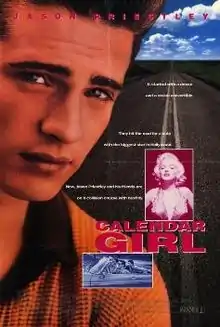Calendar Girl (1993 film)
Calendar Girl is a 1993 American comedy-drama film starring Jason Priestley, Gabriel Olds, and Jerry O'Connell. The film was directed by John Whitesell and written by Paul W. Shapiro. Set in 1962, it tells the story of three young men who go on a trip to Hollywood to fulfil their dream of meeting Marilyn Monroe. It has similarities to the real-life story of Gene Scanlon, who in 1953 crossed America with a friend and had a date with Marilyn Monroe for which she paid the bill.[1]
| Calendar Girl | |
|---|---|
 Theatrical release poster | |
| Directed by | John Whitesell |
| Produced by | Elliott Abbott Penny Marshall |
| Written by | Paul W. Shapiro |
| Starring | |
| Music by | Hans Zimmer |
| Cinematography | Tom Priestley Jr. |
| Edited by | Wendy Greene Bricmont |
| Distributed by | Columbia Pictures |
Release date |
|
Running time | 90 minutes |
| Language | English |
| Box office | $2 million (US) |
Plot
While Marilyn Monroe is enjoying her rise to stardom and iconic pop culture status, three childhood friends are happy enough to sneakily obtain racy pictures of her for their pubescent enjoyment. Once they mature (at least by age), Roy has his eyes set on joining the Military despite his strained relationship with his father. His buddy, Scott, has a prosthetic leg and is to be married soon to his darling significant other Becky, and his other pal, Ned, known affectionately as "Bleuer", works at a small town store and is not initially as anxious to partake on this crazed notion as his friends.
Thanks to Roy's Uncle, the three desirous and hapless friends shack up at his place out in California where they yearn to meet—if only for a brief second—the fabulous and stunning Miss Marilyn Monroe. Their quest leads to shenanigans and silliness ensues as they arrange the most brainless ideas to win over their idol. One includes corralling a "sad" cow to moo outside of Miss Monroe's luxurious residence, another has the guys speeding after Marilyn towards a nude beach and an entirely separate subplot has them dodging some bad guys that are after Roy.
Eventually, however, it is up to Marilyn to pity the trio's collectively desperate agony. The boys devise a clever scheme to avoid Miss Monroe's hawkish maid and Roy slips in the question, to which Marilyn refuses a date. This leads to further despair amongst the trio. They begin to regret coming out for the trip and they decide to go out on the town one last time.
Surprisingly, in a sudden twist, Monroe finally does agree to a date upon the sandy splendor of the Californian beach. Initially, while animosity has grown between the three friends, Roy is designated to be the lucky one that gets to hopefully "canoe" Miss Monroe, but nonchalantly, he passes off the opportunity to his buddy "Bleuer" who surprisedly agrees and treats the lovely Miss Monroe to a wonderful platonic night.
While Roy (in his macho way) is disappointed by Bleuer's effort, the boys return home to the sad news that Marilyn has abruptly died of a drug overdose. Back home, Scott continues his plans to marry his love, Becky, and Roy tussles with his father in the gym which leads to one last touching moment between the two before Roy is shipped out to boot camp. The last image seen is of Bleuer as he embraces his wild side and partakes in a wild telephone booth gathering that woos a local college girl in his favor.
Cast
- Jason Priestley as Roy Darpinian
- Gabriel Olds as Ned Bleuer
- Jerry O'Connell as Scott Foreman
- Joe Pantoliano as Harvey Darpinian
- Steve Railsback as Mr. Darpinian
- Kurt Fuller as Arturo Gallo
- Lisa Stahl Sullivan as Delphine
- Stephen Tobolowsky as Antonio Gallo
- Emily Warfield as Becky O'Brien
- Leslie Wing as Mrs. Bleuer
- Christine Taylor as Melissa Smock
- Liz Vassey as Sylvia
- Maxwell Caulfield as Man in Bathrobe
- Chubby Checker as himself
- Stephanie Anderson as Marilyn Monroe
- Cortney Page as voice of Marilyn Monroe
- Tuesday Knight as Nude Woman
- Curt Truman as Bobby Kennedy Jr
- Joe Dietl as Usher
Reception
The movie received poor reviews and has since gone out of print.[2][3] One of the factors that had an impact on the film once it reached theaters was the controversy surrounding the casting of one of the characters - one of the Gallo brothers in the movie was deaf; the producers cast a hearing person in that role in spite of there having been a number of deaf actors that would have been equally suitable for the role. That fact ignited outrage in the deaf community and which ultimately organized a series of protests across the country to coincide with the nationwide release of the film.[4] The movie has since received an approval rating of 11% based on 19 critics.[5]
References
- https://www.youtube.com/watch?v=ID2MHknR4QU
- Wilmington, Michael (September 3, 1993). "MOVIE REVIEW : A Watchable, Likable 'Calendar Girl' - Los Angeles Times". Los Angeles Times. Retrieved March 27, 2017.
- Maslin, Janet (September 3, 1993). "Reviews/ Film; Boys Act Out a Crush on Marilyn Monroe - New York Times". The New York Times. Retrieved March 27, 2017.
- Jay Mathews (August 26, 1993). "Deaf Activists to protest exclusion from Film". Washington Post. Retrieved December 7, 2020.
- "Calendar Girl (1993)". Rotten Tomatoes.